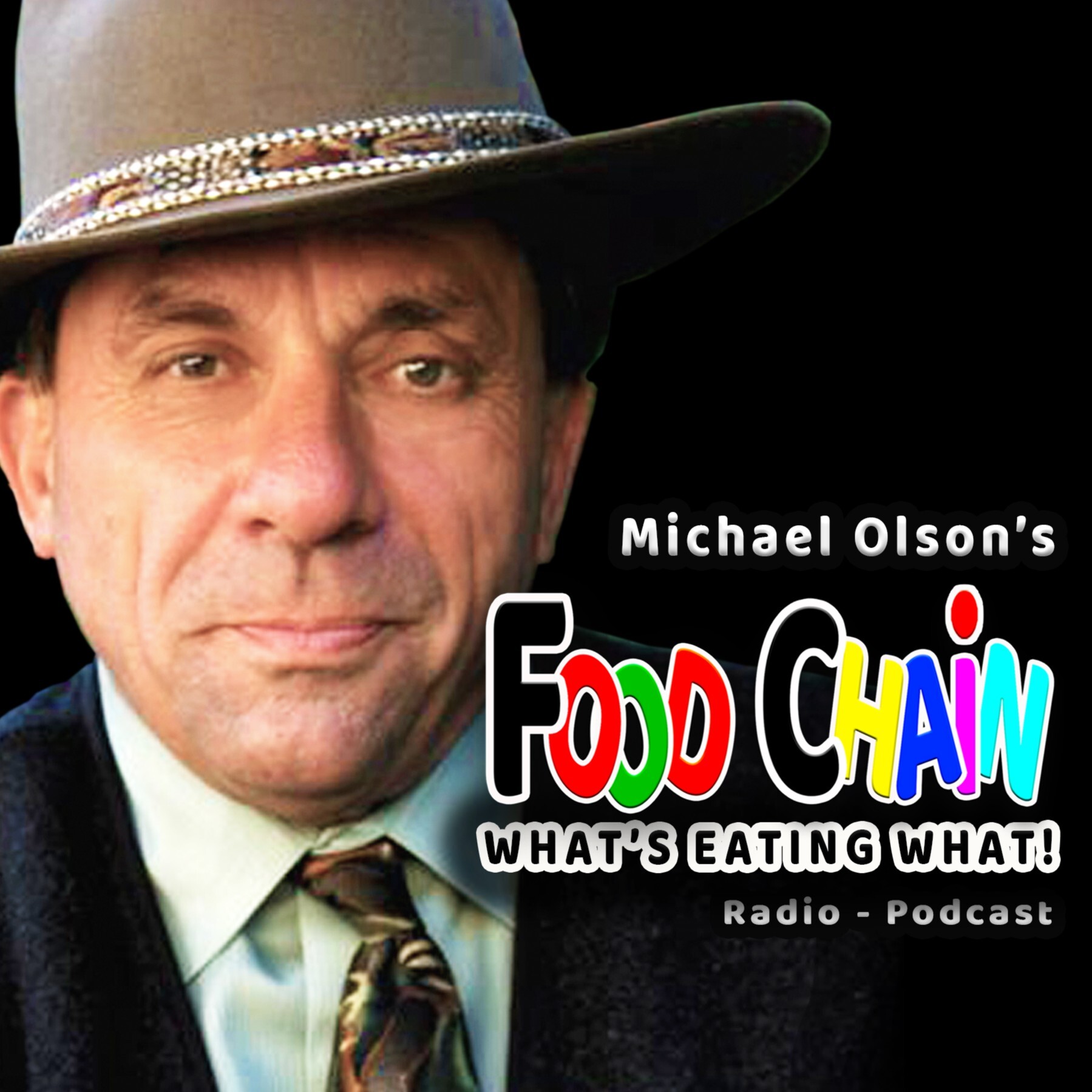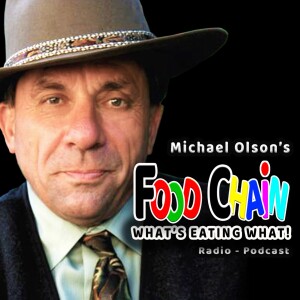
1.4K
Downloads
75
Episodes
It’s a fact! 100% of men, women and children eat food, and 97.5% of must buy their food from others who bring it from an average of 2,000 miles away. And so the hungry ask: ”What’s in this tomato? Who planted that broccoli? Is it safe to eat genetically engineered corn? Why are they irradiating meat? Are we running short of water? Why is China growing our apples? What will happen to us if we can no longer farm? How safe is our food chain?” The Food Chain is an audience-interactive syndicated newstalk radio program and podcast broadcasting weekly on radio stations and streaming on demand on the internet. The Food Chain, which has been named the Ag/News Show of the Year by California’s legislature, is hosted by Michael Olson, author of the Ben Franklin Book of the Year award-winning MetroFarm, a 576-page guide to metropolitan agriculture. The Food Chain is available live via GCN Starguide GE 8 and delayed via MP3/FTP. For clearance and/or technical information, please call Michael Olson at 831-566-4209 or email michaelo@metrofarm.com
Episodes

4 days ago
4 days ago
The label on the meat package reads, “Product of USA.” But the meat in the package could have come from Australia, Brazil or China, and be from one animal or hundreds of animals. This leads us to ask:
Should government be forced to accommodate local food farms?
The 1406th edition of the Food Chain Radio Podcast with Michael Olson features Judith McGeary, Founder and CEO, Farm and Ranch Freedom Alliance, for a conversation about the “Livestock Owned by Communities to Advance Local Foods Act” aka “Local Foods Act.”
Topics include how the consolidation of the nation’s food supply chain has resulted in the diminishment of food quality and selection; why government supports the consolidation of food into ever fewer sources; and how government might be forced to accommodate local food farms.

Thursday Dec 11, 2025
Ep 1405: Nutritional Epigenetics & The Decline of Children's Brains
Thursday Dec 11, 2025
Thursday Dec 11, 2025
A recent review of U.S. special education data revealed a three-fold increase in autism and a four-fold increase in delayed development among public school children. That leads us to ask:
Can bad food make good genes go bad?
The 1405th edition of the Food Chain Radio Podcast with Michael Olson features Dr. Renee Dufault, Executive Director and Principal Investigator, Food Ingredient & Health Research Institute, whose research points to one of the reasons for the three-fold increase in autism and four-fold increase in delayed development among public school children.
Topics include how Dr. Dufault’s research at the U.S. Food and Drug Administration led to her private research into the heavy metal contamination of ultra-processed foods; how nutritional epigenetics describes the deterioration of the brains of public school children; and how that mental deterioration is compounded through generations of people.

Wednesday Dec 03, 2025
Ep 1404 House 453 - Immunity for Pesticide Manufacturers?
Wednesday Dec 03, 2025
Wednesday Dec 03, 2025
On August 10, 2018, a California jury awarded Benecia public school landscaper Dewayne Lee Johnson $289 million for the non-Hodgkin lymphoma he claimed was caused by exposure to Monsanto’s Roundup weedkiller. That award leads us to ask:
Should manufacturers be held accountable for the consequences of their pesticides?
The 1404the edition of the Food Chain Radio Podcast with Michael Olson features Attorney Brent Wisner, whose firm, Wisner Baum LLP, won the $289 million Monsanto Roundup lawsuit on behalf of public school landscaper Dewayne Lee Johnson.
Topics include what Wisner told the jury that convinced them to believe Johnson instead of Monsanto; how the pesticide industry is fighting back with House Appropriation Bill 453 to grant pesticide manufacturers immunity from lawsuits; and whether manufacturers should be held accountable for the consequences of their pesticides.

Friday Nov 21, 2025
Ep 1244 Fast Food - Weeds of the Food Chain
Friday Nov 21, 2025
Friday Nov 21, 2025
Michael Olson hoss Professor Catherine Keske, Ag Economist, University of California, Merced & Author, “Fast Food is Comforting, But…,”
It does not take long for weeds to take over one’s garden. The same can be said for how quickly fast food can displace good food in one’s diet. And so we ask:
How does fast food displace good food?
Topics include the extent to which poor communities, like college students, rely on fast foods; how fast foods displace good foods; and what might be done to bring good foods back into the community’s diet.

Friday Nov 14, 2025
Ep 1297 Pet Nation
Friday Nov 14, 2025
Friday Nov 14, 2025
Guest: Mark Cushing, CEO of Animal Policy Group and author of Pet Nation
Twenty years ago, Duke the Dog lived out in the backyard. Now he lives in the house and sleeps in a bed. And so we ask:
How did the United States become a Pet Nation?
Topics include a look at how animals became pets that fly on planes with us; how the transformation from working animals to pets was made; and how pets are now transforming the nation’s economy.

Wednesday Nov 05, 2025
Ep 1403 BABY'S HEAVY METAL FOOD
Wednesday Nov 05, 2025
Wednesday Nov 05, 2025
A decade-long study of baby food released by Healthy Babies – Bright Futures claims that 95% of commercial baby food contains heavy metals that can result in autism spectrum and attention-deficit disorders. And so we ask…
Should grocers be allowed to sell baby foods that contain toxic heavy metals?
Topics include how heavy metals like arsenic, cadmium, lead and mercury pollute 95% of the nation’s baby food; what government and industry are doing to reduce the heavy metal pollution in baby food; and how attorney groups are putting the red-hot poker of litigation to the efforts of government and industry to reduce the pollution.

Thursday Oct 30, 2025
Ep 1304 China: Eating Up America's Farmland?
Thursday Oct 30, 2025
Thursday Oct 30, 2025
Michael Olson with Washington State Congressman Dan Newhouse
China is buying up America’s farmland… with the money we send it to manufacture stuff for us in their coal-burning factories. Some say this a good deal because we don’t have to work in those factories. Others say it’s a bad deal because we are selling out our future. And so we ask:
Should China be allowed to buy up America’s best farmland?
Topics include why China is having trouble feeding its people; how China is buying up America's farmland; and whether Congressman Dan Newhouse and fellow legislators can stop China from buying up America's farmland.

Wednesday Oct 22, 2025
EP 1402 LOCALIZING - A GOOD FOOD PROJECT
Wednesday Oct 22, 2025
Wednesday Oct 22, 2025
Food Chain Radio Podcast with Michael Olson features Michele Thorne, Executive Director of The Good Meat Project
Given the economies of consolidation, 99% of chickens, 98% of hogs and 70% of cows are now grown and processed on industrial-scaled farms, most all of which use antibiotics, pesticides and pharmaceuticals.
Topics include how the production of meat has been consolidated into the hands of very few, very big businesses; the consequence of that consolidation on the quality of food and environment; and how one might localize one’s meat supply chain with ethical meat from ethical farmers.
Have you ever purchased meat from its farmer?
